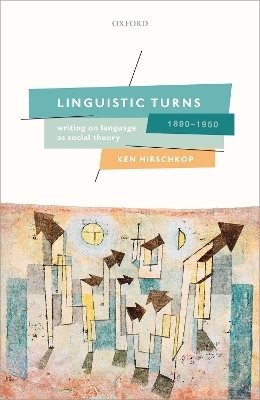
Linguistic Turns, 1890-1950
Oxford University Press (Verlag)
978-0-19-874577-8 (ISBN)
Linguistic Turns rewrites the intellectual and cultural history of early twentieth-century Europe. In chapters that study the work of Saussure, Russell, Wittgenstein, Bakhtin, Benjamin, Cassirer, Shklovskii, the Russian Futurists, Ogden and Richards, Sorel, Gramsci, and others, it shows how European intellectuals came to invest 'language' with extraordinary force, at a time when the social and political order of the continent was itself in question. By examining linguistic turns in concert rather than in isolation, the volume changes the way we see them--no longer simply as moves in individual disciplines, but as elements of a larger constellation, held together by common concerns and anxieties. In a series of detailed readings, the volume reveals how each linguistic turn invested 'language as such' with powers that could redeem not just individual disciplines but Europe itself. It shows how, in the hands of different writers, language becomes a model of social and political order, a tool guaranteeing analytical precision, a vehicle of dynamic change, a storehouse of mythical collective energy, a template for civil society, and an image of justice itself. By detailing the force linguistic turns attribute to language, and the way in which they contrast 'language as such' with actual language, the volume dissects the investments made in words and sentences and the visions behind them. The constellation of linguistic turns is explored as an intellectual event in its own right and as the pursuit of social theory by other means.
Ken Hirschkop is Associate Professor of English at the University of Waterloo.
Preface
1: Introduction: Linguistic turns as social theory
Part I: Order
2: 'Grammar can only be studied in the crowd': Reason, analogy, and the nature of social consent (Ferdinand de Saussure)
3: The ship of logic on the high seas of discourse (Gottlob Frege, Bertrand Russell, Ludwig Wittgenstein, a little Gilbert Ryle)
4: Saussure and the Soviets (Kartsevskii, G. O. Vinokur, Iakubinskii)
5: On the diversityDLand productivityDLof language (M. M. Bakhtin, Walter Benjamin, Saussure)
Part II: Myth
6: Do they believe in magic? The word as myth, name, and art (C. K. Ogden and I. A. Richards, Frege, George Orwell, Bakhtin, Saussure)
7: Myth you can believe in (Ernst Cassirer, Viktor Shklovskii, Velimir Khlebnikov, Roman Jakobson, Benjamin)
Excursus: Reversing out: Sorel's heroic myth, Gramsci's slow magic
8: High anxiety, becalmed language, ordinary language philosophy (Wittgenstein, J. L. Austin)
Conclusion: Motorways and Cul-de-sacs: What the linguistic turns turned to
| Erscheinungsdatum | 30.05.2019 |
|---|---|
| Verlagsort | Oxford |
| Sprache | englisch |
| Maße | 163 x 236 mm |
| Gewicht | 582 g |
| Themenwelt | Geschichte ► Allgemeine Geschichte ► Neuzeit (bis 1918) |
| Geschichte ► Teilgebiete der Geschichte ► Kulturgeschichte | |
| Geisteswissenschaften ► Philosophie ► Philosophie der Neuzeit | |
| Geisteswissenschaften ► Philosophie ► Sprachphilosophie | |
| Geisteswissenschaften ► Sprach- / Literaturwissenschaft ► Anglistik / Amerikanistik | |
| Geisteswissenschaften ► Sprach- / Literaturwissenschaft ► Literaturwissenschaft | |
| Geisteswissenschaften ► Sprach- / Literaturwissenschaft ► Sprachwissenschaft | |
| ISBN-10 | 0-19-874577-X / 019874577X |
| ISBN-13 | 978-0-19-874577-8 / 9780198745778 |
| Zustand | Neuware |
| Haben Sie eine Frage zum Produkt? |
aus dem Bereich


